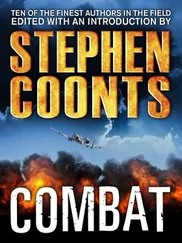Stephen Coonts - The Disciple
Здесь есть возможность читать онлайн «Stephen Coonts - The Disciple» весь текст электронной книги совершенно бесплатно (целиком полную версию без сокращений). В некоторых случаях можно слушать аудио, скачать через торрент в формате fb2 и присутствует краткое содержание. Жанр: Триллер, на английском языке. Описание произведения, (предисловие) а так же отзывы посетителей доступны на портале библиотеки ЛибКат.
- Название:The Disciple
- Автор:
- Жанр:
- Год:неизвестен
- ISBN:нет данных
- Рейтинг книги:4 / 5. Голосов: 1
-
Избранное:Добавить в избранное
- Отзывы:
-
Ваша оценка:
- 80
- 1
- 2
- 3
- 4
- 5
The Disciple: краткое содержание, описание и аннотация
Предлагаем к чтению аннотацию, описание, краткое содержание или предисловие (зависит от того, что написал сам автор книги «The Disciple»). Если вы не нашли необходимую информацию о книге — напишите в комментариях, мы постараемся отыскать её.
The Disciple — читать онлайн бесплатно полную книгу (весь текст) целиком
Ниже представлен текст книги, разбитый по страницам. Система сохранения места последней прочитанной страницы, позволяет с удобством читать онлайн бесплатно книгу «The Disciple», без необходимости каждый раз заново искать на чём Вы остановились. Поставьте закладку, и сможете в любой момент перейти на страницу, на которой закончили чтение.
Интервал:
Закладка:
“Which tunnel is that?”
“The executive bunker,” she said. “The galleries are over a hundred meters below the surface. If the Israelis or Americans attack with conventional or nuclear weapons, the Supreme Leader, President Ahmadinejad, and the key mullahs and parliamentary supporters will ride out the hostilities in this bunker. They could stay down there, cut off from the world, for years before their supplies ran out.”
“What about the people on the surface?”
“In a nuclear war, anyone without a bunker ticket is going to be cremated alive or die of radiation poisoning, either fast or slow.”
“While the mullahs will be safe below,” Ghasem mused, “urging us martyrs on to glory.”
“Something like that,” Davar muttered. She made a note on a sheet of paper and continued to stare at the blueprints.
Realizing the conversation had reached a dead end, Ghasem left, closing the door behind him.
When the door latched, Davar stood and took a deep breath. She went to the window and gazed out. Across the rooftops she could glimpse the mountains’ snow-covered peaks and the clouds building on the windward side.
The chador was loathsome, to be sure, and the manteau only a little less so, but they weren’t very high on her list of things she hated about life in Iran. Shia Islam-the way it permeated every nook and cranny of life-was perhaps first on her list. Then there was the status of women. Oh, women could and did have careers, but in Muslim society they were strictly second-class citizens.
Then there was her father, who thought Khomeini was sent by the Prophet to straighten things out here in Iran. He was arrogant and small-minded, with a nose for which way the wind was blowing. After the Islamic Revolution he landed lucrative government contracts and became even richer. Her father was precisely what was wrong with Iran, Davar thought.
If her mother had been gone when she graduated from Oxford, she would have married that American boy who followed her around like a shadow and gone with him back to Tulsa. Her mother had still been alive, though, only dying last year. So she had made her choice. She kissed the boy, told him good-bye, donned her manteau and flew home.
Remembering her mother, she rubbed her forehead.
At least there were no more tears.
Then there was her younger brother, Khurram, whom Davar loathed. A devout Muslim and member of a volunteer paramilitary branch of the Revolutionary Guard called Basij, he believed in the revolution with all his heart and soul, and tried to make the rest of the world believe as he did. He was always getting in fights with people who criticized the revolution, the government or the president. No scholar, he was lazy and self-righteous, his sole virtue his love for fighting.
Oh, how she would love to get out of this house. Out of Iran. Out, out, out.
Unfortunately, death was the only escape.
Davar glanced at the plans for the executive bunker. Those fools… Carmellini had photographed these blueprints, she knew, so at least the Americans knew where Ahmadinejad and the mullahs were going to hide.
She had lied to him. Told him all her information came from dead drops, when in truth there was only one drop. Much of her material came from the people she knew and talked to, the young professionals who made Ahmadinejad’s nuclear program possible. If Carmellini knew their names and he was tortured, they were as good as dead.
And yet… the truth was, they were all doomed. Death would come soon for a great many Iranians, she thought, and she knew she was one of them.
“Okay,” George Washington Hosein said and handed me a folded sheet of paper, which I pocketed. G. W. was our illegal in charge in the heart of the beast. “The names on that paper are the people we know she had been meeting. There are some others, but I don’t know their names. Those four are prominent critics of the government. It’s a wonder that they’re still aboveground and breathing.”
“She figured out she’s being tailed?”
“If she knows we’re following her, she doesn’t seem to care. Nobody else is tailing her. She isn’t taking any precautions. Takes her car and goes wherever.”
“How about you and Ahmad and Joe’s guys? You got tails?”
“Clean as new pennies. Not a soul is interested in us.”
We were in the main bazaar, and Hosein was again selling fruit and veggies from his stand. He had to keep up appearances. I paid him for a pear and automatically rubbed it on my sleeve without thinking.
“Don’t you dare eat that without washing it,” he whispered fiercely. “They’ll have to hammer a cork up your ass to keep you from shitting yourself to death. This is a non-toilet-paper country, Tommy. Use your goddamn head.”
I felt foolish. After all, I spend half my life in the third world. I acknowledged the point and inspected the apples.
“So what do you think?” I asked.
G. W. glanced around to see if anyone was listening to us. “I think Davar is skating on damn thin ice,” he muttered.
CHAPTER EIGHT
The ScanEagle drones arrived over the southern part of the Iranian city of Tabriz in midafternoon. There were two of them; one went into an orbit at nine thousand feet above the ground, the other ten thousand. They were very small, weighing just forty pounds each, with a wingspan of about ten feet, and if they were detected by Iranian radar, there was no Iranian response. The Iranian radars were indeed sweeping-black boxes in the drones detected every pulse-yet the skinpaint returns were very small, easy to overlook on the Iranians’ air traffic control scopes, if they were displayed at all. Usually returns this small were classified as static and automatically eliminated from the presentation.
Both ScanEagles contained a variety of sensors, the size, type and sensitivity limited only by their small carrying capacity. Today one broadcast an encrypted television camera signal to a satellite in geosynchronous orbit; the other sent an infrared picture.
The area of interest was a large, low, flat-roofed building, a factory, in the southern suburbs of the city. The cameras watched as the workers left for the evening and the parking lot emptied. The watchmen on their hourly hikes around the building were picked up by the sensors, and their routes and times carefully noted and compared to past observations.
The people doing the comparing were sitting in a command and control center at Balad Air Force Base in Iraq. The data the ScanEagles were broadcasting was painstakingly compared to the database, which had been compiled in evening and nightly observations by drones every evening for the last two weeks.
Two colonels conferred, then went to the general, who was standing behind the monitors looking at the raw video.
“Everything is the same as it was,” one of the colonels said. “Nothing out of the ordinary.”
“Have we heard from our guy on the ground?”
“Yes, sir. He said the right code words.”
“Then it’s a go,” the general said.
“Yes, sir.”
“Launch ’em.”
“Yes, sir.”
The general walked over to an encrypted satellite telephone and placed a call to the duty officer in the War Room of the Pentagon.
It was nearly midnight in Tabriz when three Russian-made Mi-24 Hind heli cop ters swept across the rooftops of the city and landed in the parking lot of the factory. Six soldiers in Iranian uniforms, armed with AK-47s, jumped from each helo. As the members of one squad took up defensive positions around the building, an officer led the other two to the main entrance.
The guard there looked at them in bewilderment.
He was summarily disarmed, handcuffed and led away. The officer opened the door, and the troops trotted through it.
Читать дальшеИнтервал:
Закладка:
Похожие книги на «The Disciple»
Представляем Вашему вниманию похожие книги на «The Disciple» списком для выбора. Мы отобрали схожую по названию и смыслу литературу в надежде предоставить читателям больше вариантов отыскать новые, интересные, ещё непрочитанные произведения.
Обсуждение, отзывы о книге «The Disciple» и просто собственные мнения читателей. Оставьте ваши комментарии, напишите, что Вы думаете о произведении, его смысле или главных героях. Укажите что конкретно понравилось, а что нет, и почему Вы так считаете.












